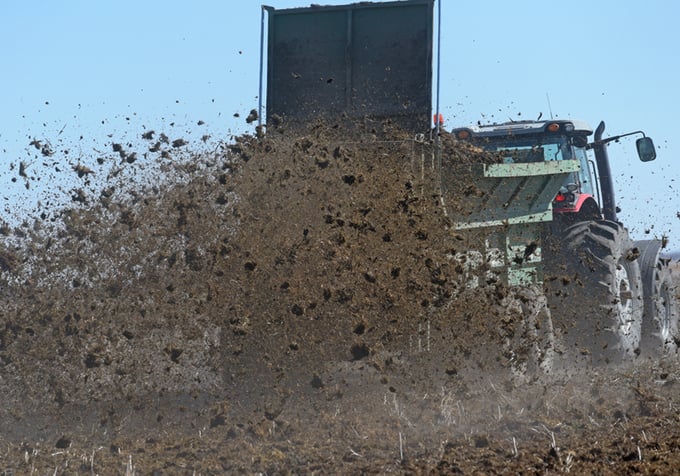November 27, 2025 | 20:31 GMT +7
November 27, 2025 | 20:31 GMT +7
Hotline: 0913.378.918
November 27, 2025 | 20:31 GMT +7
Hotline: 0913.378.918

There is an answer to the challenge of fertilizer application, but it’s so outrageous that it won’t occur, according to John Heard, soil fertility specialist with Manitoba Agriculture. | File photo
“Phosphorus fertilization can reduce N2O emissions derived from N-fertilization but increase CO2 emissions,” according to a February 2022 report in the journal Nature.
There is an answer to the challenge of fertilizer application, but it’s so outrageous that it won’t occur, according to John Heard, soil fertility specialist with Manitoba Agriculture.
“We could take all the excess manure from livestock operations in Ontario and Quebec, then precision apply it to the impoverished soils out here on the Prairies. But that’s not going to happen,” he added with a laugh.
Heard says providing crops with sufficient nitrogen in a sustainable manner is not difficult. It means taking a field out of production to grow a nitrogen-fixing crop for one year. However, managing phosphorus in a responsible manner is a different issue because it is not a renewable resource.
“We have to get serious about recycling the phosphorus we apply to our fields. We’re already doing that on a small scale with Crystal Green or struvite.”
Crystal Green is a fertilizer product that provides a continuous release of phosphorus. It’s made by extracting 85 percent of the phosphorus and 25 percent of the nitrogen from livestock wastewater.
While most people think of reducing commercial fertilizer inputs for greater sustainability, Heard said Manitoba doesn’t agree.
“We’re going the opposite way with our recommendations in Manitoba. We feel that long-term sustainability with phosphorus involves bringing levels up to a good working range.
“We’ve changed our way of thinking. We previously used the sufficiency approach. Now we know how much trouble that got us into. We depleted our soils. So now we offer farmers the option of replenishing phosphorus levels, rebuilding those soils.
“Now, that runs counter to your story line about reducing fertilizer inputs. I’m not with you on the idea that sustainability means cutting way back on fertilizer. We’re going different paths now. Sustainability does not always mean putting on less. We’re telling farmers to put on more phosphorus. That’s our story and we’re sticking to it.”
Heard said that if a farmer is convinced that sustainability means less commercial fertilizer, then that farmer should allocate the available commercial nutrients to the areas that need it most. This applies not only to phosphorus, but to other nutrients.
He speculates that if social pressure or the federal government should ever force farmers to apply less fertilizer, it will lower food production and increase food prices.
He said farmers would likely take some land out of commercial production to grow their own nitrogen. This would exacerbate the drop in production.
“Precision agriculture technology will not bail us out if major cutbacks become necessary. Precision ag helps us make best use of what we have, but it will only buffer the collapse of farming. By stretching available resources, it will slow the decline in food production.
“Limiting the supply of fertilizer will also have the effect of raising the price. When that happens, farmers will turn to precision technology as a means to spoon feed expensive nutrients like phosphorus.”
(Producer)

(VAN) A new study reveals how the simultaneous effects of ocean acidification, salinity and loss of oxygen are making the world more fragile.

(VAN) Hopes are growing that the creation of the first 3D turkey gut model could be a turning point in the battle against the virulent blackhead disease.

(VAN) Tyson, America’s biggest meat supplier, plans to shutter one of its largest beef processing plants as the industry continues to struggle with low cattle supplies and political pressure from Washington.

(VAN) New FAO study shows how digital solutions are empowering farmers and fishers to prevent losses and build resilient agrifood systems.

(VAN) Brazil's COP30 presidency pushed through a compromise climate deal on Saturday that would boost finance for poor nations coping with global warming but that omitted any mention of the fossil fuels driving it.

(VAN) Poultry farmers in the UK have been warned that they could face one of the worst winters yet for bird flu.

(VAN) Prices of main-crop paddy have risen sharply, with jasmine rice hitting 16,100 baht per tonne — the highest level in years.